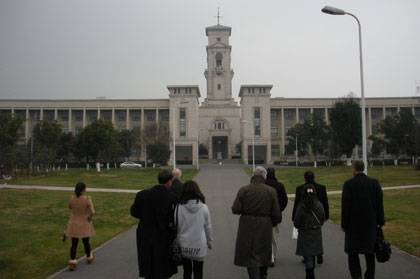
As Duke and its partners continue to prepare for the launch of
Duke Kunshan University, a team of Duke administrators has just returned from a
week-long planning trip to China that included time in Kunshan, Suzhou, Ningbo
and Shanghai.
The group was led by Jim Roberts, executive vice provost for
finance and administration, and Nora Bynum, associate vice provost for global
strategy and programs and managing director for DKU and China initiatives. Roberts and Bynum are Duke's delegates to the
DKU Executive Preparation Committee, the governing body appointed by Duke,
Wuhan University and the city of Kunshan to coordinate preparations for the
opening of DKU.
In Kunshan, the group held planning meetings with partners
from Wuhan University and the city of Kunshan to begin establishing human
resources, financial and marketing operations for DKU, which China's Ministry
of Education has indicated its intention to approve in the near future. Duke President Richard Brodhead joined the
group for two days of planning meetings in Kunshan and a tour of the DKU
construction site, after meeting
with China's Vice Minister of Education Hao Ping and U.S. State Department
officials in Beijing.
Tim Walsh, vice president for finance, led the group
planning financial operations for DKU.
"We covered a lot of ground in a short time, and were
able to make important progress not only on financial projections for DKU, but
also working through many topics related to financial management at DKU," Walsh
said.
"For example, we will need to establish bank accounts,
financial reporting systems, and procurement practices for DKU, and unlike our
operations in Durham, we'll need to be able to manage and report from these
systems in Chinese and English, and in compliance with Chinese regulatory
requirements. These are all areas where
our partners in Wuhan and Kunshan continue to provide valuable guidance based
on their experience and best practices."
The partners also discussed plans to begin hiring for key
positions based at DKU. "Although we developed a DKU staffing model some
time ago, we're now at the point where we need to begin recruiting for key
staff positions," said Kyle Cavanaugh, vice president for administration,
who led HR discussions in China. "Hiring and employment laws are different
in China, so part of what we're doing now is working with Wuhan and Kunshan to
make sure we adapt to Chinese practices while ensuring that we recruit senior
staff at a world-class level."
Cavanaugh, who oversees campus safety at Duke, also worked
with colleagues and service providers in China to refine plans for DKU campus
security and on-site medical care.
Laura Brinn, director of global communications, and
colleagues from Wuhan and Kunshan coordinated marketing and communications
strategy for DKU and worked with local designers on the development of DKU's visual
identity.
Members of the group spent part of their time in Kunshan and
Suzhou investigating housing options for DKU faculty and staff, including
school offerings for children of faculty and staff. Bynum also spent several days in Hong Kong
during the trip. There she hosted an
event for local alumni and visited local universities to explore possible
future collaborations with DKU.
"We made an incredible amount of progress during this
trip," Bynum said. "Establishing operations for a new university is
certainly challenging, but everyone is focused on achieving exceptional results
as we build systems and processes from the ground up."
The group also visited with the leadership teams of Xian
Jiaotong-Liverpool University in Suzhou and The University of Nottingham Ningbo
China, both of which were created by partnerships between Chinese and foreign
institutions. At both universities, the
group learned about the specific opportunities and challenges faced by
Sino-foreign institutions in China.
"This is an exciting time for higher education in China
and globally," said Mingzheng Shi, executive director for DKU, who
organized the group's meetings in China. "Our meetings at the universities
in Ningbo and Suzhou helped us compare and contrast different ways of running a
joint venture university. It was also very exciting for the group to see just
how far both of those universities have come after only five or six years of
operation."